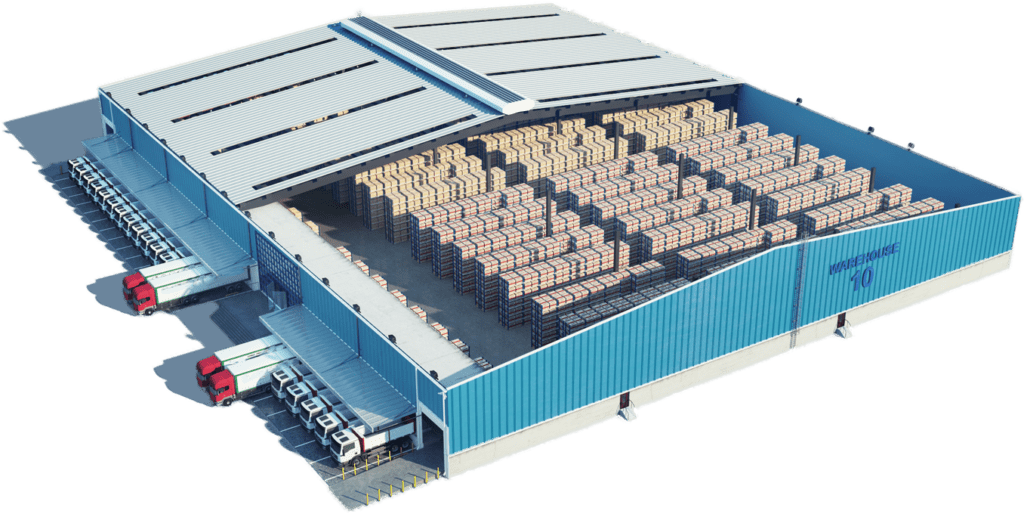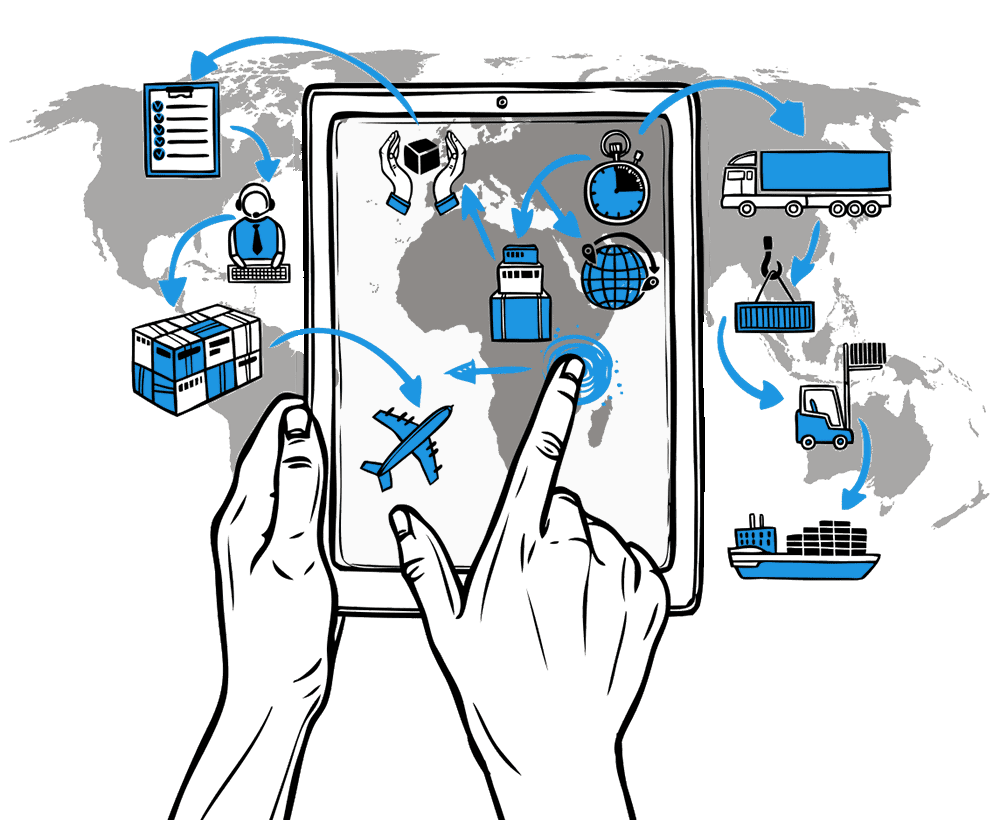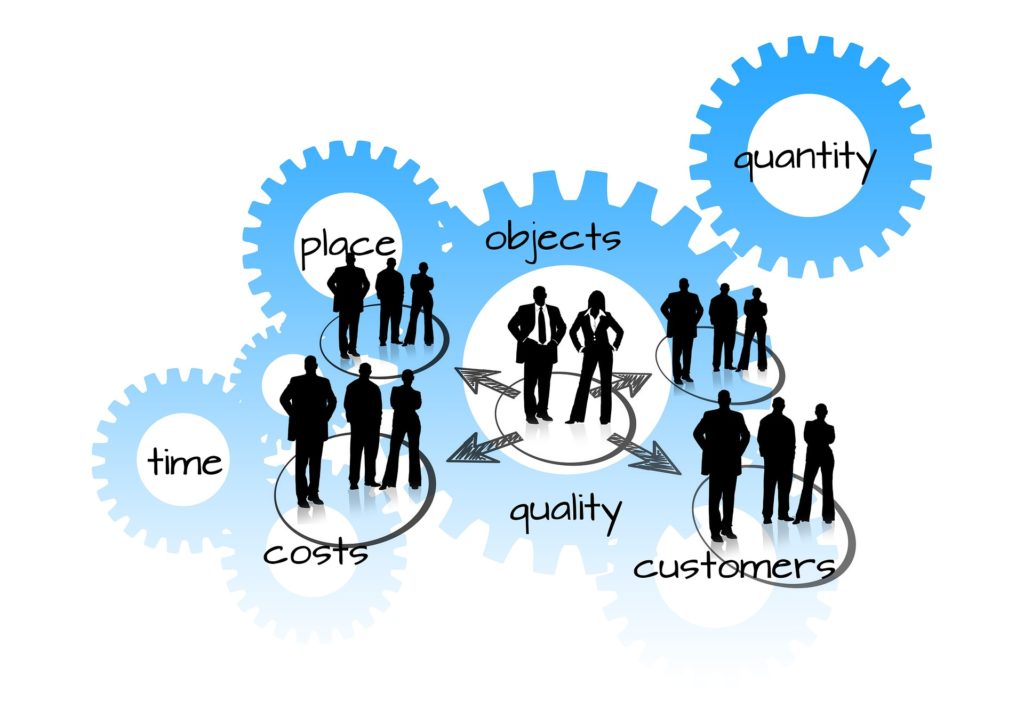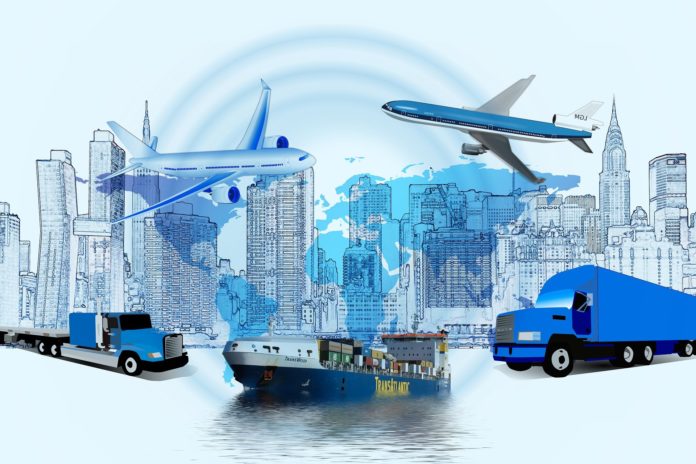Logistics management is the process of planning, organizing, and controlling the flow of goods, services, and information from the point of origin to the point of consumption in order to meet customer requirements. It is a key component of supply chain management.
The four main areas of logistics management are:
Purchasing management: This involves sourcing the right materials and supplies at the right price and in the right quantity.
Inventory management: This involves keeping track of the amount of inventory on hand and ensuring that it is sufficient to meet customer demand.
Warehousing management: This involves storing inventory in a safe and efficient manner.
Transportation management: This involves moving inventory from one location to another in a timely and cost-effective manner.
Other important aspects of logistics management include:
Packaging: This involves ensuring that goods are properly packaged to protect them during transportation.
Order processing: This involves receiving and fulfilling customer orders.
Customer service: This involves providing support to customers with their orders.
The role of logistics management is to ensure that goods are delivered to customers in a timely, efficient, and cost-effective manner. This can be a complex task, as it involves coordinating the activities of many different people and organizations. However, effective logistics management can help businesses to improve their bottom line and provide better customer service.
Here are some of the benefits of effective logistics management:
Increased customer satisfaction: By ensuring that goods are delivered on time and in good condition, logistics management can help to improve customer satisfaction.
Reduced costs: By optimizing the flow of goods, logistics management can help to reduce costs associated with transportation, inventory, and warehousing.
Improved efficiency: By streamlining the logistics process, logistics management can help to improve efficiency and productivity.
Enhanced flexibility: By being able to adapt to changing customer demands, logistics management can help businesses to remain competitive.
If you are interested in a career in logistics management, there are a few things you can do to prepare. First, you should gain a strong understanding of the different aspects of logistics management. You can do this by taking courses or reading books and articles on the subject. Second, you should develop your skills in problem-solving, communication, and teamwork. These are all essential skills for success in logistics management. Finally, you should gain experience in the logistics industry. This can be done by working for a logistics company or by volunteering for a logistics-related organization.
logistics management meaning in easy words
here is the meaning of logistics management in easy words:
Logistics management is the process of moving things from where they are to where they need to be, in the right quantity, at the right time, and at the right cost. It involves all aspects of the supply chain, from procurement to transportation to warehousing to delivery.
In simpler terms, logistics management is about getting the right product to the right place at the right time. It’s about making sure that customers get what they need, when they need it, and without any hassle.
Here are some of the things that logistics management involves:
- Planning: This involves determining the best way to move goods from one location to another. This includes factors such as transportation mode, route, and timing.
- Procurement: This involves sourcing the right materials and supplies at the right price and in the right quantity.
- Inventory management: This involves keeping track of the amount of inventory on hand and ensuring that it is sufficient to meet customer demand.
- Warehousing: This involves storing inventory in a safe and efficient manner.
- Transportation: This involves moving inventory from one location to another in a timely and cost-effective manner.
- Packaging: This involves ensuring that goods are properly packaged to protect them during transportation.
- Order processing: This involves receiving and fulfilling customer orders.
- Customer service: This involves providing support to customers with their orders.
Logistics management is a complex and challenging field, but it’s also a very rewarding one. By effectively managing the flow of goods, logistics professionals can help businesses to improve their bottom line and provide better customer service.
What is the role of logistics management?

The role of logistics management is to plan, organize, and control the flow of goods, services, and information from the point of origin to the point of consumption in order to meet customer requirements. It is a key component of supply chain management.
The specific roles of logistics management vary depending on the industry and the specific company. However, some common roles include:
- Planning and scheduling: This involves developing plans for the movement of goods, services, and information. This includes determining the best routes, modes of transportation, and timing for deliveries.
- Procurement: This involves sourcing the right materials and supplies at the right price and in the right quantity.
- Inventory management: This involves keeping track of the amount of inventory on hand and ensuring that it is sufficient to meet customer demand.
- Warehousing: This involves storing inventory in a safe and efficient manner.
- Transportation: This involves moving inventory from one location to another in a timely and cost-effective manner.
- Packaging: This involves ensuring that goods are properly packaged to protect them during transportation.
- Order processing: This involves receiving and fulfilling customer orders.
- Customer service: This involves providing support to customers with their orders.
Logistics management is a critical function for any business that wants to be successful. By effectively managing the flow of goods, logistics professionals can help businesses to improve their bottom line and provide better customer service.
Here are some of the benefits of effective logistics management:
- Increased customer satisfaction: By ensuring that goods are delivered on time and in good condition, logistics management can help to improve customer satisfaction.
- Reduced costs: By optimizing the flow of goods, logistics management can help to reduce costs associated with transportation, inventory, and warehousing.
- Improved efficiency: By streamlining the logistics process, logistics management can help to improve efficiency and productivity.
- Enhanced flexibility: By being able to adapt to changing customer demands, logistics management can help businesses to remain competitive.
If you are interested in a career in logistics management, there are a few things you can do to prepare. First, you should gain a strong understanding of the different aspects of logistics management. You can do this by taking courses or reading books and articles on the subject. Second, you should develop your skills in problem-solving, communication, and teamwork. These are all essential skills for success in logistics management. Finally, you should gain experience in the logistics industry. This can be done by working for a logistics company or by volunteering for a logistics-related organization.
Why required logistics management

Logistics management is required for a number of reasons, including:
- To ensure that goods are delivered on time and in good condition. This is essential for customer satisfaction, as no one wants to wait too long for their goods or receive them damaged.
- To reduce costs. By optimizing the flow of goods, logistics management can help to reduce costs associated with transportation, inventory, and warehousing.
- To improve efficiency. By streamlining the logistics process, logistics management can help to improve efficiency and productivity.
- To meet customer demands. By being able to adapt to changing customer demands, logistics management can help businesses to remain competitive.
- To comply with regulations. There are a number of regulations governing the transportation and storage of goods, and logistics management can help businesses to comply with these regulations.
- To reduce risk. By carefully managing the logistics process, logistics management can help to reduce the risk of damage, theft, and other disruptions.
In today’s global economy, logistics management is essential for businesses of all sizes. By effectively managing the flow of goods, logistics professionals can help businesses to improve their bottom line and provide better customer service.
Here are some specific examples of how logistics management can be used to improve a business:
- A retailer can use logistics management to ensure that products are delivered to stores on time and in good condition. This can help to improve customer satisfaction and reduce the number of returns.
- A manufacturer can use logistics management to reduce the cost of shipping raw materials and finished goods. This can help to improve the bottom line.
- A logistics company can use logistics management to optimize the routing of trucks and other vehicles. This can help to reduce fuel consumption and emissions.
- A government agency can use logistics management to ensure that disaster relief supplies are delivered quickly and efficiently. This can help to save lives and property.
Logistics management is a complex and challenging field, but it’s also a very rewarding one. By effectively managing the flow of goods, logistics professionals can help businesses to improve their bottom line and provide better customer service.
Functions of logistics management

The functions of logistics management are the activities involved in planning, organizing, and controlling the flow of goods, services, and information from the point of origin to the point of consumption. They are essential for ensuring that goods are delivered on time, in the right quantity, and in good condition.
The main functions of logistics management are:
- Planning and scheduling: This involves developing plans for the movement of goods, services, and information. This includes determining the best routes, modes of transportation, and timing for deliveries.
- Procurement: This involves sourcing the right materials and supplies at the right price and in the right quantity.
- Inventory management: This involves keeping track of the amount of inventory on hand and ensuring that it is sufficient to meet customer demand.
- Warehousing: This involves storing inventory in a safe and efficient manner.
- Transportation: This involves moving inventory from one location to another in a timely and cost-effective manner.
- Packaging: This involves ensuring that goods are properly packaged to protect them during transportation.
- Order processing: This involves receiving and fulfilling customer orders.
- Customer service: This involves providing support to customers with their orders.
These functions are often interrelated, and they must be coordinated in order to achieve the desired outcome. For example, the planning and scheduling function must take into account the availability of inventory, the capacity of transportation, and the needs of customers.
The specific functions of logistics management that are most important will vary depending on the industry and the specific company. However, all businesses that need to move goods from one place to another will need to engage in some form of logistics management.
Here are some of the benefits of effective logistics management:
- Increased customer satisfaction: By ensuring that goods are delivered on time and in good condition, logistics management can help to improve customer satisfaction.
- Reduced costs: By optimizing the flow of goods, logistics management can help to reduce costs associated with transportation, inventory, and warehousing.
- Improved efficiency: By streamlining the logistics process, logistics management can help to improve efficiency and productivity.
- Enhanced flexibility: By being able to adapt to changing customer demands, logistics management can help businesses to remain competitive.
- Compliance with regulations: There are a number of regulations governing the transportation and storage of goods, and logistics management can help businesses to comply with these regulations.
- Reduced risk: By carefully managing the logistics process, logistics management can help to reduce the risk of damage, theft, and other disruptions.
Logistics management is a complex and challenging field, but it’s also a very rewarding one. By effectively managing the flow of goods, logistics professionals can help businesses to improve their bottom line and provide better customer service.
importance of logistics management

The importance of logistics management cannot be overstated. It is essential for businesses of all sizes to effectively manage the flow of goods, services, and information from the point of origin to the point of consumption.
Here are some of the key importance of logistics management:
- Customer satisfaction: By ensuring that goods are delivered on time, in the right quantity, and in good condition, logistics management can help to improve customer satisfaction. This is essential for businesses that want to retain customers and grow their business.
- Reduced costs: By optimizing the flow of goods, logistics management can help to reduce costs associated with transportation, inventory, and warehousing. This can free up resources that can be used to improve other aspects of the business, such as product development or marketing.
- Improved efficiency: By streamlining the logistics process, logistics management can help to improve efficiency and productivity. This can lead to faster deliveries, lower costs, and happier customers.
- Enhanced flexibility: By being able to adapt to changing customer demands, logistics management can help businesses to remain competitive. This is especially important in today’s global economy, where businesses need to be able to react quickly to changes in the market.
- Compliance with regulations: There are a number of regulations governing the transportation and storage of goods, and logistics management can help businesses to comply with these regulations. This can help to avoid costly fines and penalties.
- Reduced risk: By carefully managing the logistics process, logistics management can help to reduce the risk of damage, theft, and other disruptions. This can help to protect businesses from financial losses.
In conclusion, logistics management is an essential function for businesses of all sizes. By effectively managing the flow of goods, services, and information, logistics professionals can help businesses to improve their bottom line, provide better customer service, and remain competitive.
what is logistics and supply chain management

Logistics and supply chain management are two closely related terms that are often used interchangeably. However, there is a subtle difference between the two.
Logistics management is the process of planning, organizing, and controlling the flow of goods, services, and information from the point of origin to the point of consumption. It is a narrower term than supply chain management, which encompasses all the activities involved in getting a product to market, from the sourcing of raw materials to the delivery of the finished product to the customer.
Here are some of the key activities involved in logistics management:
- Transportation: This involves moving goods from one location to another.
- Warehousing: This involves storing goods in a safe and efficient manner.
- Packaging: This involves ensuring that goods are properly packaged to protect them during transportation and storage.
- Inventory management: This involves keeping track of the amount of goods on hand and ensuring that it is sufficient to meet customer demand.
- Order fulfillment: This involves receiving and fulfilling customer orders.
- Customer service: This involves providing support to customers with their orders.
Supply chain management, on the other hand, is a broader term that encompasses all the activities involved in getting a product to market, from the sourcing of raw materials to the delivery of the finished product to the customer. It includes logistics management, but it also includes other activities such as:
- Procurement: This involves sourcing the right materials and supplies at the right price and in the right quantity.
- Manufacturing: This involves converting raw materials into finished goods.
- Distribution: This involves moving finished goods from the manufacturer to the retailer.
- Marketing: This involves promoting and selling the product to customers.
- Customer service: This involves providing support to customers after they have purchased the product.
In short, logistics management is a subset of supply chain management. It focuses on the physical movement of goods, while supply chain management encompasses all the activities involved in getting a product to market.
The importance of logistics and supply chain management cannot be overstated. They are essential for businesses of all sizes to effectively manage the flow of goods, services, and information from the point of origin to the point of consumption. By effectively managing these processes, businesses can improve customer satisfaction, reduce costs, and improve their bottom line.
difference between logistics and supply chain management
Logistics and supply chain management are two closely related terms, but they have distinct differences.
Logistics management is the process of planning, organizing, and controlling the flow of goods, services, and information from the point of origin to the point of consumption. It focuses on the physical movement of goods and materials.
Supply chain management (SCM), on the other hand, is a broader term that encompasses all the activities involved in getting a product to market, from the sourcing of raw materials to the delivery of the finished product to the customer. It includes logistics management, but it also includes other activities such as:
- Procurement: This involves sourcing the right materials and supplies at the right price and in the right quantity.
- Manufacturing: This involves converting raw materials into finished goods.
- Distribution: This involves moving finished goods from the manufacturer to the retailer.
- Marketing: This involves promoting and selling the product to customers.
- Customer service: This involves providing support to customers after they have purchased the product.
In short, logistics management is a subset of supply chain management. It focuses on the physical movement of goods, while supply chain management encompasses all the activities involved in getting a product to market.
Here is a table summarizing the key differences between logistics and supply chain management:
| Characteristic | Logistics | Supply Chain Management |
|---|---|---|
| Focus | Physical movement of goods | All activities involved in getting a product to market |
| Scope | Narrower | Broader |
| Activities | Transportation, warehousing, inventory management, packaging, order fulfillment, customer service | Procurement, manufacturing, distribution, marketing, customer service |
| Benefits | Improved customer satisfaction, reduced costs, improved efficiency | Improved customer satisfaction, reduced costs, improved efficiency, increased profitability |
logistics and supply chain management courses

There are many different logistics and supply chain management courses available online and in person. Some of the most popular courses include:
- Introduction to Logistics and Supply Chain Management: This course provides an overview of the field of logistics and supply chain management. It covers topics such as the different activities involved in logistics and supply chain management, the importance of logistics and supply chain management, and the challenges faced by logistics and supply chain managers.
- Logistics Management: This course focuses on the physical movement of goods and materials. It covers topics such as transportation, warehousing, inventory management, and packaging.
- Supply Chain Management: This course covers all the activities involved in getting a product to market. It covers topics such as procurement, manufacturing, distribution, marketing, and customer service.
- Lean Six Sigma: This course teaches the principles of lean manufacturing and Six Sigma. These principles can be applied to logistics and supply chain management to improve efficiency and reduce costs.
- Supply Chain Analytics: This course teaches how to use data and analytics to improve logistics and supply chain management. It covers topics such as data mining, predictive analytics, and simulation.
- Supply Chain Risk Management: This course teaches how to identify and mitigate risks in logistics and supply chain management. It covers topics such as natural disasters, political instability, and cyberattacks.
The best course for you will depend on your career goals and interests. If you are interested in a career in logistics, then you should take a course that focuses on the physical movement of goods and materials. If you are interested in a career in supply chain management, then you should take a course that covers all the activities involved in getting a product to market.
If you are unsure which course is right for you, you can talk to a career counselor or a logistics or supply chain management professional. They can help you assess your skills and interests and recommend the best course for you.
In addition to formal courses, there are also many resources available online and in libraries that can help you learn about logistics and supply chain management. These resources include books, articles, websites, and blogs.
mba in logistics and supply chain management
An MBA in logistics and supply chain management is a graduate-level degree that provides students with the skills and knowledge they need to manage the flow of goods, services, and information from the point of origin to the point of consumption.
The program typically includes courses in:
- Logistics management
- Supply chain management
- Transportation
- Warehousing
- Inventory management
- Risk management
- Data analytics
- Project management
- Business strategy
- Leadership
MBA in logistics and supply chain management programs are offered by a variety of universities, both online and in person. The program length varies, but most programs take two years to complete.
The cost of an MBA in logistics and supply chain management also varies, but it typically ranges from $30,000 to $100,000.
If you are interested in a career in logistics and supply chain management, an MBA can be a valuable credential. The degree can help you to develop the skills and knowledge you need to succeed in this field.
Here are some of the benefits of getting an MBA in logistics and supply chain management:
- Increased earning potential: MBA graduates in logistics and supply chain management typically earn higher salaries than those with a bachelor’s degree.
- Enhanced career opportunities: An MBA can open up new career opportunities in logistics and supply chain management, such as management positions, consulting positions, and analyst positions.
- Improved problem-solving skills: MBA programs teach students how to identify and solve complex problems, which is essential for success in logistics and supply chain management.
- Enhanced analytical skills: MBA programs teach students how to use data and analytics to make better decisions, which is essential for success in logistics and supply chain management.
- Developed leadership skills: MBA programs teach students how to lead and motivate others, which is essential for success in logistics and supply chain management.
If you are considering getting an MBA in logistics and supply chain management, there are a few things you should keep in mind. First, you should make sure that you have the necessary prerequisites, such as a bachelor’s degree in business or a related field. Second, you should research different programs to find one that is a good fit for your needs and interests. Finally, you should be prepared to commit to the time and financial investment required to complete the program.
diploma in logistics and supply chain management
A diploma in logistics and supply chain management is a post-secondary qualification that provides students with the skills and knowledge they need to work in the logistics and supply chain management field.
The program typically includes courses in:
- Logistics management
- Supply chain management
- Transportation
- Warehousing
- Inventory management
- Risk management
- Data analytics
- Project management
- Business communication
Diploma in logistics and supply chain management programs are offered by a variety of institutions, both online and in person. The program length varies, but most programs take one to two years to complete.
The cost of a diploma in logistics and supply chain management also varies, but it typically ranges from $10,000 to $30,000.
If you are interested in a career in logistics and supply chain management, a diploma can be a valuable credential. The degree can help you to develop the skills and knowledge you need to succeed in this field.
Here are some of the benefits of getting a diploma in logistics and supply chain management:
- Increased employability: Diploma graduates in logistics and supply chain management are in high demand and have good job prospects.
- Enhanced career opportunities: A diploma can open up new career opportunities in logistics and supply chain management, such as entry-level positions, associate positions, and specialist positions.
- Improved problem-solving skills: Diploma programs teach students how to identify and solve complex problems, which is essential for success in logistics and supply chain management.
- Enhanced analytical skills: Diploma programs teach students how to use data and analytics to make better decisions, which is essential for success in logistics and supply chain management.
If you are considering getting a diploma in logistics and supply chain management, there are a few things you should keep in mind. First, you should make sure that you have the necessary prerequisites, such as a high school diploma or equivalent. Second, you should research different programs to find one that is a good fit for your needs and interests. Finally, you should be prepared to commit to the time and financial investment required to complete the program.
what is supply chain management in logistics

Supply chain management is the process of planning, organizing, and controlling the flow of goods, services, and information from the point of origin to the point of consumption. It is a broad term that encompasses all the activities involved in getting a product to market, from the sourcing of raw materials to the delivery of the finished product to the customer.
Logistics management is a subset of supply chain management. It focuses on the physical movement of goods and materials. It includes activities such as transportation, warehousing, inventory management, packaging, order fulfillment, and customer service.
Supply chain management and logistics management are closely related terms, but they have distinct differences. Supply chain management is a broader term that encompasses all the activities involved in getting a product to market, while logistics management focuses on the physical movement of goods and materials.
Here is a table summarizing the key differences between supply chain management and logistics management:
| Characteristic | Supply Chain Management | Logistics Management |
|---|---|---|
| Focus | All activities involved in getting a product to market | Physical movement of goods |
| Scope | Broader | Narrower |
| Activities | Procurement, manufacturing, distribution, marketing, customer service, transportation, warehousing, inventory management, packaging, order fulfillment | Transportation, warehousing, inventory management, packaging, order fulfillment, customer service |
| Benefits | Improved customer satisfaction, reduced costs, improved efficiency, increased profitability | Improved customer satisfaction, reduced costs, improved efficiency |
In today’s global economy, supply chain management is essential for businesses of all sizes. By effectively managing the flow of goods, services, and information, businesses can improve customer satisfaction, reduce costs, and improve their bottom line.
Here are some of the benefits of effective supply chain management:
- Reduced costs: By optimizing the flow of goods, supply chain management can help to reduce costs associated with transportation, inventory, and warehousing.
- Improved efficiency: By streamlining the supply chain process, supply chain management can help to improve efficiency and productivity.
- Enhanced flexibility: By being able to adapt to changing customer demands, supply chain management can help businesses to remain competitive.
- Compliance with regulations: There are a number of regulations governing the transportation and storage of goods, and supply chain management can help businesses to comply with these regulations.
- Reduced risk: By carefully managing the supply chain process, supply chain management can help to reduce the risk of damage, theft, and other disruptions.
logistics management conclusion

Here are some of the key conclusions about logistics management:
- Logistics management is essential for businesses of all sizes.
- By effectively managing the flow of goods, logistics professionals can help businesses to improve customer satisfaction, reduce costs, and improve their bottom line.
- Logistics management is a complex and challenging field, but it is also a very rewarding one.
- There are many different career paths in logistics management, from entry-level positions to senior-level management positions.
- The demand for logistics professionals is expected to grow in the coming years, as businesses continue to expand their operations and globalize their supply chains.
If you are interested in a career in logistics management, there are a few things you can do to prepare. First, you should gain a strong understanding of the different aspects of logistics management. You can do this by taking courses or reading books and articles on the subject. Second, you should develop your skills in problem-solving, communication, and teamwork. These are essential skills for success in logistics management. Finally, you should gain experience in the logistics industry. This can be done by working for a logistics company or volunteering for a logistics-related organization.
